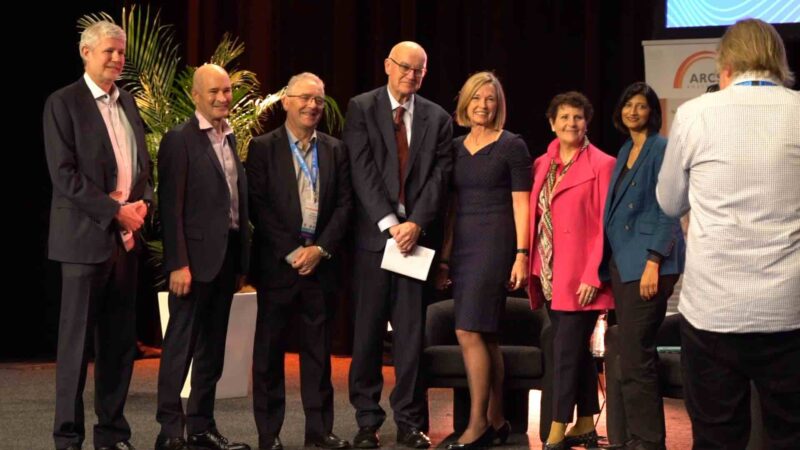AUSTRALIAN CANCER CARE NETWORK LAUNCHES TO LINK SERVICES TO POPULATION, CLINICIANS & RESEARCHERS
Aims to reduce health system disparities and tackle cancers with low survival rates
The landscape of cancer care in Australia is set to transform with the Australian Government launch in May 2024 of the Australian Comprehensive Cancer Network (ACCN) at the Innovations Showcase event, hosted by Cancer Australia in Sydney, Australia.
The ACCN is a nationally integrated system of cancer care, aimed at enhancing patient experiences and outcomes through coordinated and equitable access, by linking to comprehensive cancer services across Australia. Anchored by Comprehensive Cancer Centres (CCCs), the ACCN strives to deliver evidence-driven prevention, diagnosis, treatment, and support to all Australians affected by cancer.
Comprehensive Cancer Centres (CCCs) will serve as anchors in the ACCN, connecting various cancer control services nationwide. Through building partnerships and harnessing virtual connectivity, CCCs will collaborate with other cancer care centres, academic institutions, Aboriginal Community Controlled Health Services, regional hospitals and allied health services, among others.
While Australia has some of the world’s highest cancer survival rates, not all people experience equal outcomes. There are significant disparities in cancer outcomes for some populations, particularly affecting those in rural and remote regions, as well as Aboriginal and Torres Strait Islander communities.
The ACCN aims to address these disparities, emphasising coordinated and equitable access to comprehensive cancer services irrespective of where a person lives, and marking a significant milestone in the advancement of cancer care in Australia.
Australian Health Journal spoke with Professor Dorothy Keefe CEO, Cancer Australia on the ACCN launch and the network being a major milestone in the Australian Cancer Plan, which was launched at the end of 2023.
Participation in the ACCN is voluntary, with services committing to a set of standards focusing on comprehensive cancer care, equitable access, research excellence, data collection, workforce development, and network connectivity. Importantly, the ACCN will complement existing networks and alliances within the cancer care landscape, fostering collaboration and maximising resources.
All services and professionals involved in cancer care are encouraged to join the ACCN and contribute to this transformative initiative.
“As part of the implementation of the Australian Cancer Plan launched in November, the ACCN represents an essential stage towards achieving our goals of improving cancer outcomes and experiences for all Australians.”, says Professor Keefe.
She points out, “To achieve world class cancer outcomes for all Australians and realise the ambition of the Australian Cancer Plan, we need collective action from all sectors of health care to address issues that contribute to variation in cancer outcomes and experience.”
You Might also like
-
FULL FEATURE Consumers and communities as agents of health care change and improvement
Policymakers, health administrators and clinicians must learn and embrace new ways to harness the transformative role consumers, community members and carers can play. Conversely, consumers and communities need support, capability and capacity to engage as equals in policy, research, program and service design. This is necessary if are to be less technocratic and realise the vision where all members of society can live the best life possible.
-
Recognising service in health regulation
In April 2023, Professor John Skerritt retired from his position of Deputy Secretary Health Products Regulation Group, a role he has been in since 2012. During his time at the TGA he had line responsibility for over 1200 staff involved in the regulation of therapeutic goods, regulation of gene technology and industrial chemicals and control of drug import, export and production.
At this year’s ARCS 2023 Conference, ARCS Australia CEO Dr Shanny Dyer paid tribute to Professor Skerritt and his service to the Australian health industry. She led a tribute with fellow industry heads, Elizabeth de Somer, CEO, Medicines Australia, Anne Harris, Managing Director, Pfizer Australia & New Zealand, Deon Schoombie, CEO, Consumer Healthcare Products Australia, Ian Burgess, CEO, Medical Technology Association of Australia and Arthur Brandwood, President ARCS Australia.
-
Foundation outlines breast cancer research strategy
Australian Health Journal met with Associate Professor Cleola Anderiesz, CEO of the National Breast Cancer Foundation to hear of the new 5 year Pink Horizon research strategy. Those with lived experience of breast cancer, along with researchers, clinicians, and other funding organisations, have contributed to the development of the foundation’s new five-year Pink Horizon research strategy. This ambitious plan aims to invest $125 million to accelerate research efforts towards the vision of ending deaths from breast cancer.



